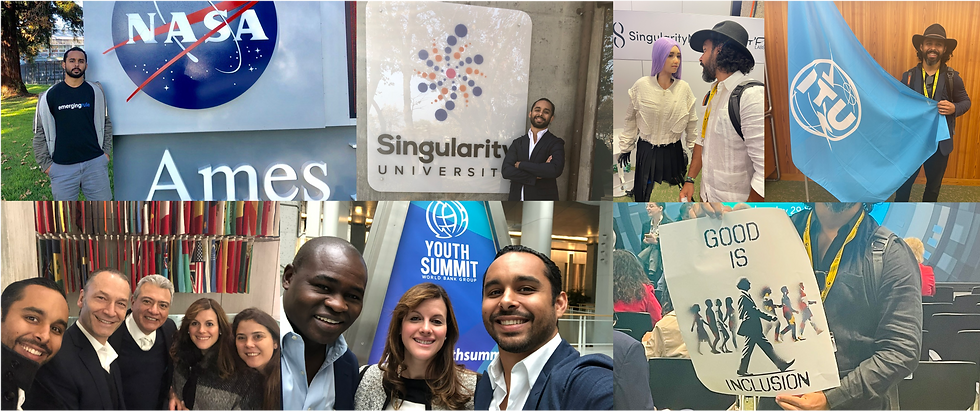Enough is enough: We have to Create a Culture of Collaboration and Inclusion in the Age of AI to Fix
- Felipe

- May 8, 2023
- 4 min read

I understand that progress in the field of AI can sometimes feel slow. I know that it's important to remember that creating meaningful change often takes time, especially when it involves complex and rapidly evolving technologies like AI. But in recent years, there have been growing concerns about potential risks associated with Artificial Intelligence (AI) that are simply not in tune with the complexity of the situation.
As I've mentioned before, AI has achieved in less than a century what took humans hundreds of thousands of years to achieve. Therefore, while issues such as job displacement, privacy violations, and the perpetuation of biases and inequalities are undoubtedly critical, their cause and effect may also be more within the domain of human responsibility than that of AI. Although these issues should have been dealt with centuries ago, they can now be tackled with the help of machines due to their ability to process vast amounts of big data and make predictions for better decision-making. However, the rapid pace of technological change makes it challenging, if not impossible, to solve these issues with traditional regulatory frameworks and ethical guidelines that struggle to keep up with the speed of progress.
While identifying these problems is a crucial first step, finding solutions that comprehensively and effectively address these issues has become more challenging, because some are giving AI, human traits without necessity. For example, in many cases, the laws and guidelines that are in place today were developed before the advent of AI and for another age, and may not fully account for the unique risks and challenges associated with this technology, nor the immense benefits it could offer to everything alive. Also, solutions that worked in the past may not be effective in the context of AI. Traditional education and training programs may not be sufficient to prepare people for the changing workforce, given the unique technical and interpersonal skills needed to work alongside AI.
I know that despite these challenges, many of us are working to advance the development and deployment of humane, inclusive, reforming, and trustworthy AI. However, I believe that those continuing to use the terms responsible and ethical are confusing the old ways with a potentially optimal social system of the future. One crucial step to advance towards a more coexistent future is to invest in education and training programs that prepare people for the changing transitional workforce and help them develop the skills they need to thrive alongside AI. This could involve rethinking our educational systems to focus more on lifelong learning and skill recognition/allocation, as well as creating new training programs that help people develop the technical and interpersonal competences needed to live in a world with increasingly advanced AI systems and robotics, which perform all of our tedious tasks and enable us to live a better quality of life.
It's important to remember that ethical guidelines and regulations are region-specific and temporary. They could certainly play a crucial role in ensuring that AI is developed and deployed in a way that supports abundance and coexistence, but beware as they could also be used to transfer the elitist and exclusive power dynamics of most current leadership models to an automated system of control. For example, I agree that regulations prioritizing privacy and security can help protect personal data, while regulations promoting fairness and transparency can ensure equitable development and deployment of AI systems; regulations that prioritize explainability and interpretability can help improve trust in AI systems, while regulations that promote accountability can help ensure that developers and operators of AI systems are held responsible for their actions. Additionally, regulations that address algorithmic bias can help prevent discrimination and ensure that AI systems are fair and inclusive for all individuals regardless of race, gender, or other personal characteristics.
Again, ethics and regulations alone are not a panacea and may become outdated. To harness the potential of AI to create abundance and coexistence, we need to cultivate a culture of collaboration and inclusion that prioritizes the needs and interests of all people (Yesterday). This will involve developing new models of governance that are more participatory and inclusive, and investing in research that explores how AI can address pressing global challenges, such as climate change, ignorance, and economic inequality.
So in short, while the challenges associated with AI are significant, there are many reasons to be optimistic about the future of this technology if we continue to give it tasks that align with human capabilities. AI is not human and doesn't perform like humans, so it should be given tasks where humans have failed. For example, AI can process large amounts of data quickly, identify patterns, and make predictions that would take humans much longer to achieve. Instead of wasting time on power struggles, we should focus on utilizing AI's strengths to benefit society.
As a note, it's important to remember that just over 150 years ago, what was the "ethical practice" of slavery was abolished in America. However, there are still numerous countries where modern slavery exists, and efforts are underway to end it.
This serves as a reminder that progress can be made if we are willing to change our ways of thinking and embrace new technologies that can help us create a more just, equitable, and abundant future for all. However, this will only happen if we let go of outdated thinking and work together to develop and implement practical solutions that address the unique risks and challenges of systems that can solve problems in seconds, compared to the centuries it would take for humans to solve them. Simply said, and echoing Apple's brilliant slogan, we need you to "Think Different".





Comments